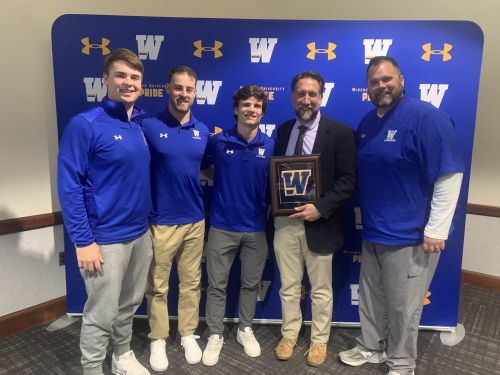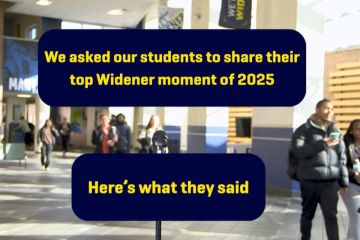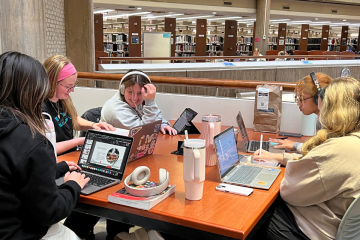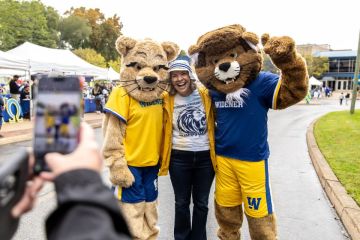From the Classroom to the Playing Field: Widener Professors Join Athletic Teams to Support Student-Athletes

Nearly one-quarter of Widener University students are varsity athletes.
When not in the classroom or in the lab, at internships or studying, they can often be found training, practicing, traveling to games, and of course, competing for the Pride. This dedication can lead to hectic schedules and sometimes competing responsibilities.
Student-athletes often turn to their coaches first for academic support and help with their schedules. At the same time, university administrators found that some professors did not fully appreciate the time commitment involved with being a student-athlete at Widener.
Officials realized that both sides of the campus experience — and of course the students themselves — would benefit from teaming up.
The result — the Athletic Faculty Advisor Program, designed to address these issues by helping bridge the divide between academics and athletics, with the goal of supporting students, improving communication, and strengthening connections across campus.
We’re breaking down the barrier. Academics and athletics are coming from a different perspective, but we’re all serving the same person." — Associate Athletic Director Larissa Gillespie, who is spearheading the initiative
Entering its second season, the Athletic Faculty Advisor Program pairs at least one faculty member with each varsity team. Professors attend practices and games, get to know the student-athletes, and serve as an academic mentor in a somewhat less formal manner by counseling students, answering questions, or directing them to resources.
The program is also designed to alleviate scheduling conflicts by working to arrange class and practice schedules to accommodate student-athletes and create more flexibility.
And the faculty advisors partner with coaches to assist with recruiting, including meeting with prospective student-athletes and families when they visit campus.
When Donna McCloskey, associate dean for undergraduate programs in the School of Business Administration, first became the faculty advisor for Widener women’s basketball, she sat in the stands during games. McCloskey was quickly embraced by the team and now sits on the bench alongside the players and coaching staff, cheering on the blue and gold.
McCloskey is a longtime faculty member and the university’s NCAA faculty athletics representative. But even she didn’t realize all that went in to being a student-athlete.
“I never fully understood how many students were here for winter break. Through this program, we’re seeing students as a whole person. It’s student-centric and it creates a stronger community,” said McCloskey, who gifted socks and chocolate to her team for the winter holidays.
Brynn Foley ’24, a psychology major and member of women’s soccer, said it’s invaluable to have Itzick Vatnick, professor of biology, biochemistry, and environmental science, as the team faculty advisor.
Having (Professor Vatnick) as our academic liaison is definitely useful, even for business majors who need help because he’s another person who knows the academics and he’s very knowledgeable." — Brynn Foley '24, a member of women's soccer
A huge women’s soccer fan and staunch Pride supporter, Vatnick is the academic point person for the Athletic Faculty Advisor Program. He also advocates for more of his colleagues to support athletics.
“Seeing students in the classroom is just a small part of their experience at Widener. A large part of the experience occurs outside the classroom, and many are involved in athletics,” said Vatnick, who is known to bring orange slices to practices for the soccer team.
He adds: “Having the recognition of their faculty creates a real sense of well-being. These students are working hard and representing us really well. They’re carrying the name and face of Widener.”
Coaches, professors, and students alike acknowledge the boost that student-athletes get from seeing faculty members at their games.
“It’s incredibly important. They get to see their university supports them, not just athletes supporting athletes,” said women’s soccer Coach Melissa Franks.
The culture of support on campus for student-athletes starts at the top. President Stacey Robertson is often at home games cheering on the Pride, and Provost Andy Workman has been hugely supportive of the Athletic Faculty Advisor Program.
Men's lacrosse player Matt Buckley ’24 has found Vice Provost Mark Nicosia’s involvement with his squad a major boost. The mechanical engineering major was able to chat with Nicosia, the team’s faculty advisor and an engineering professor, about the 4+1 engineering pathway program, and how he might manage a graduate school curriculum with lacrosse.
“He explained to me how classes work at the graduate level and he’s very approachable,” said Buckley.
When men’s lacrosse made the playoffs, and Buckley discovered that two of his final exams conflicted with the games, he turned to Nicosia for help in working with his professors to make accommodations.
These types of conflicts can cause major stress for student-athletes, said men’s lacrosse Coach Robb Chambers.
Having Mark (Nicosia) has helped tremendously. He can serve as a go-between to figure situations out. He’s our number one fan. He stands in the substitution box at games and is right there with a smile on." — Coach Robb Chambers, noting that Nicosia even shows up to review game film with the team
Each faculty member will serve at least two years with their team before potentially rotating off. Advisors have found their way onto teams in a variety of ways. Some were personally requested by the student-athletes, as was the case with Vatnick; his love of women’s soccer was legendary, said Foley.
Others were recruited.
When he's not studying fish in streams, or those swimming in a tank in his campus lab, biology Professor Dave Coughlin can often be found swimming laps in Widener’s pool. And that’s where men’s and women’s swim Coach Mark Yankovich found and recruited him for the program.
A longtime supporter of Widener Athletics, Coughlin jumped right in. He regularly attends swim meets and practices (the afternoon ones, not those pre-dawn ones).
“I want to bring other faculty out. Athletics is a lot of fun and it’s a real part of the experience here,” said Coughlin. “And it supports our concept of belonging. We’re bridging the gap a bit more and there’s a real outcome here.”




